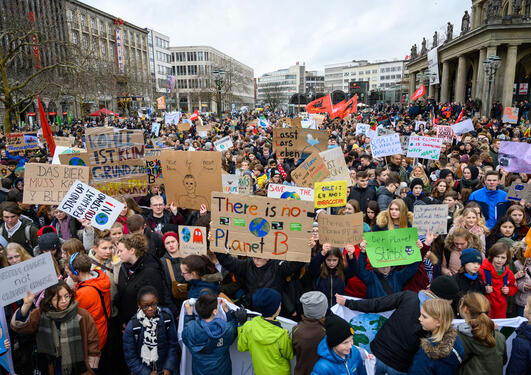Research
LINGCLIM will contribute to an improved knowledge base related to climate change knowledge in general and to humanistic perspectives on the climate issues in particular.

Main content
Climate change has in recent years moved from being mainly a physical phenomenon to being simultaneously a social, cultural and political phenomenon. At present, both individual and collective attitudes and behaviour seem an equally serious challenge in the climate issue as scientific knowledge of the phenomenon itself, and in this, language and communication are crucial. Language not only reflects and expresses, but also influences attitudes and behaviour, and thus constitutes a vital component of the cultural prerequisites underlying societal development.
The following is the overarching research question of LINGCLIM: To what extent and in what way does language matter in climate change representations and interpretations?
LINGCLIM will contribute to an improved knowledge base related to climate change knowledge in general and to humanistic perspectives on the climate issues in particular. The project will also contribute to a substantial methodological renewal through its multidisciplinary approach taking linguistics and discourse analysis as its point of departure and in collaboration with geophysical, psychological and political scientists.
The primary objectives are to
- generate new and integrated knowledge about the role of language in climate discourse through developing an innovative multidisciplinary methodology including an opinion survey and a psychological experiment in addition to comprehensive linguistic and discursive analyses;
- investigate climate discourse in a micro-analysis focusing on specific linguistic features, and in a macro-analysis based on contextual factors established through the multidisciplinary approach;
- explore the role of the perspectives of ”gloom-and-doom” vs. ”opportunities-in-a new-sustainable-society”.
We investigate to what extent instances of climate discourse may be described through a narrative structure with up to five components and a number of potential actors (victims, villains, heroes).
Three major challenges to be handled are to
- identify relevant contextual factors to be integrated in the analysis to understand the role of the components and actors in the narrative structure;
- identify explicit and hidden voices in climate discourse as well as identify what actors they represent;
- unveil the relationship between linguistic representations and psychological factors such as people’s attitudes, beliefs and responses to climate change.
The linguistic analyses will be coordinated by LINGCLIM researchers Kjersti Fløttum (head of project) and Trine Dahl. The opinion survey, in the form of an online questionnaire, will be carried out in collaboration with the more comprehensive Norwegian Citizens Panel, coordinated by LINGCLIM researcher Elisabeth Ivarsflaten. The outcome of the survey, in addition to the linguistic analyses, will also serve as important input to the psychological experiment − coordinated by LINGCLIM researcher Gisela Böhm − investigating the relationship between linguistic representations and psychological factors such as people’s attitudes, beliefs, evaluations, thought processes, and responses to climate change. Climate scientist and LINGCLIM researcher Helge Drange will play a vital role in ensuring that the statements used in the opinion survey and in the psychological experiment are in accordance with scientific understanding.

